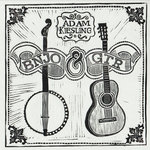| Barry Abernathy & Darrell Webb, Appalachian Road Show (Billy Blue, 2018) Adam Kiesling, BNJO & GTR (Arabica, 2018) Deanie Richardson, Love Hard, Work Hard, Play Hard (Pinecastle, 2018) These three recordings, two of them on bluegrass labels, represent unique approaches to the Southern folk tradition. None depends upon the standard old-time stringband formulation, though Barry Abernathy & Darrell Webb's Appalachian Road Show is relatively the closest. Instead, each of the artists turns to a distinctively personal vision, and each is sufficiently engaged and technically skilled to make that approach interesting and affecting.
Not only that, but Abernathy & Webb have transcended the usual trad-folk warhorses bluegrass has preserved. They've found their way to songs one rarely if ever hears voiced in bluegrass accents: "Georgia Buck" for one striking example, though Earl Scruggs did perform it as a guitar instrumental. Where today's trad-oriented artists are concerned, this is one you'd expect from the likes of Taj Mahal or the Carolina Chocolate Drops, both of whom have in fact covered it. The hard-core traditionalist David Davis & the Warrior River Boys have recorded "Milwaukee Blues" twice, but otherwise this seminal hobo song, associated most prominently with Charlie Poole, is as rare as ghost's teeth among bluegrassers. The late Craig Johnson's "Piney Mountains" feels as if at least a century old, an austere lament with fiddle. There is no such thing as a bad version of this wrenching testament -- that's because only the smartest and most conscientious musicians find their way to it -- but this version is chilling by any standard. Other traditional numbers, undeservedly obscure, include "Old Greasy Coat," "Lovin' Babe" and "I Am Just a Pilgrim," which together show they were worth resurrecting from the darkness and restoring to the light. Three Appalachian-drenched but more recently composed songs fill out the list. Road Show stands alongside Flatt & Scruggs's classic 1963 celebration of American folk song, Hard Travelin'. Let us hope Abernathy & Webb's album is not just a one-off. In a genre with a growing modernist wing, bluegrass needs to be reminded where it came from.
I wish, however, that he had put more effort into reimagining Fred Cockerham's arrangement of "Roustabout," well known to anyone who loves Appalachian music. (If you don't know who Cockerham is, of course, your listening pleasure will not be affected.) "Danville Girl," a well-known Southern ballad, is learned from the Dock Boggs version but so interestingly reworked that I didn't know that till I read the liner notes. Likewise the case with another Boggs-derived number, "Cuba," a meant-to-be-comic complaint about marital discord that Kiesling performs in a somber tone and communicates a radically different meaning. The song itself is musically and lyrically related to "If I Die a Railroad Man," a traditional song the Tenneva Ramblers famously cut in 1928. In his quiet way Mississippi John Hurt took virtually complete command of the songs he sang, whether ballads, blues, hymns or ephemeral 1920s pop ditties. Few of the covers I've heard seem other than pointless. Even so, Kiesling's take on Hurt's "Payday" is pretty good, and not simply because it's accompanied on banjo rather than guitar. Those of us with histories as copy editors will not, however, want to know that Kiesling judges Hurt "my favorite musician of all time!" Yes, exclamation point. Such only serves to underscore the fervent desire of every conscientious editor to have this particular form of punctuation (which affords the impression that the reader is being shouted at, inexplicably) eliminated from written language.
Deanie Richardson, who for two decades has fiddled in country star Patty Loveless's band, offers a glittering diamond of a solo outing in Love Hard, Work Hard, Play Hard. Though issued on the bluegrass label Pinecastle, the album focuses on bluegrass less than on styles that helped shape the genre. In a dozen cuts Richardson (not a singer) along with her guests spans a range of downhome musics. One is an authentic-sounding treatment, sung by Loveless, of the ubiquitous American folksong "Jack of Diamonds." There is even a Gaelic medley, from Richardson's days with the Chieftains, along with ragtime, honkytonk and old-time fiddle numbers such as Appalachia's "Lost Indian" and "Soppin' the Gravy" and Canada's "St. Anne's Reel." The disc concludes with "East Virginia Blues," sung by Amanda McKenney in fittingly doomed inflection. However often it's passed through my ears, this song -- probably the first Appalachian ballad I ever heard -- holds a special space in my life. It led me to decades of undiminished fascination with the music of the Southern mountains and, in due course, to Richardson's stellar release. 

|
 Rambles.NET music review by Jerome Clark 16 February 2019 Agree? Disagree? Send us your opinions!  Click on a cover image to make a selection. 



 |

 On BNJO & GTR Minneapolis folk musician Adam Kiesling plays, of course, banjo and guitar, without additional accompaniment, creating a sonic atmosphere at once spare and full. His talent is sufficiently robust that one does not long for more. His vocals aren't specifically Southern even if most of the songs and tunes are, but they don't have to be. Kiesling has given material and performance no small amount of thought, to the degree that tradition and innovation fuse so seamlessly that one doesn't know where one begins and other ends, or particularly care for that matter.
On BNJO & GTR Minneapolis folk musician Adam Kiesling plays, of course, banjo and guitar, without additional accompaniment, creating a sonic atmosphere at once spare and full. His talent is sufficiently robust that one does not long for more. His vocals aren't specifically Southern even if most of the songs and tunes are, but they don't have to be. Kiesling has given material and performance no small amount of thought, to the degree that tradition and innovation fuse so seamlessly that one doesn't know where one begins and other ends, or particularly care for that matter.

